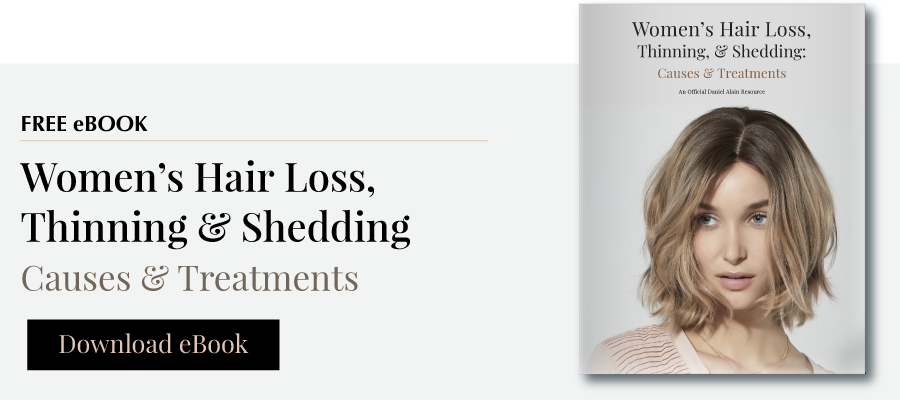What Causes Women's Hair to Fall Out?
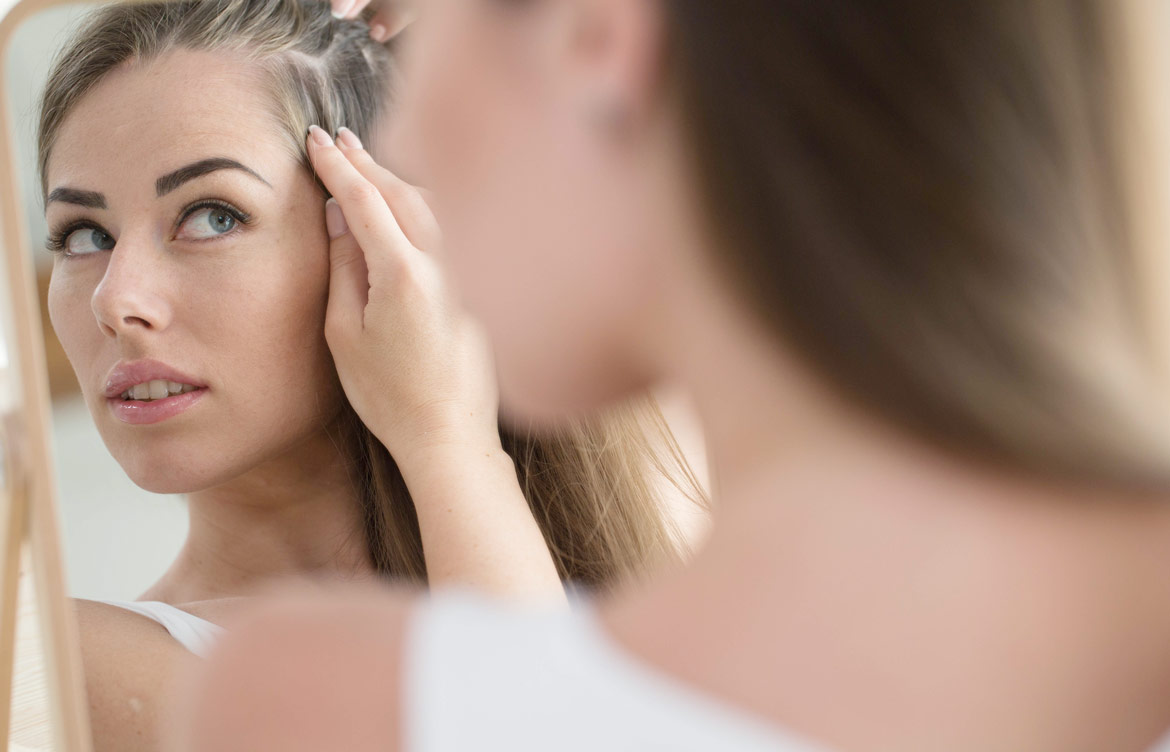
There's nothing more confusng and disheartening than watching your hair fall out in clumps. Seeing an abnormal amount of strands in your drain and brush can be really scary—especially when you don't know the exact cause of hair fall.
The average person loses between 50 to 100 strands of hair per day, and anything over 125 strands is enough to cause concern. If you're losing more hair than usual, it's important to find the underlying cause so that you can take steps to treat it and restore your mane back to its former glory.
Read on to learn more about what causes hair to fall out, and what you can do about it.
The Most Common Causes of Hair Fall in Women
Unfortunately, there are a zillion and one things that can cause hair to fall out. From rough brushing to not getting the right nutrients, there are many potential factors.
Let's dive into the most common culprits so you can get a better idea of what causes hair to fall out for you.
Washing
You might think that washing your hair every day is the best way to avoid greasy, oily strands. But in reality, over-washing can actually strip your hair of its natural oils, leading to dryness, breakage, and excess hair fall.
Washing your hair too much can also cause follicle damage, which in turn causes your hair to fall out. So, how often should you wash your hair? It depends on your individual hair type, but generally speaking, 2-3 times per week is sufficient.
Brushing
We all know that brushing our hair is important to keep it looking smooth and shiny. But did you know that over-brushing can actually cause hair fall? When you brush your hair too hard or too often, you can damage the follicles and cause the strands to break.
Try to brush your hair gently, using a wide-toothed comb to avoid tugging and pulling at the roots. Being rough on your mane will only lead to more hair fall in the long run.
Styling
By the same token, over-styling can also cause your hair to fall out. Whether you're using hot tools every day or you're constantly putting your hair up in tight styles, putting unnecessary stress on your strands can cause them to fall.
Air-drying or using a cold setting whenever possible is always best for your strands as is giving them a break from your daily ponytail. If you must style your hair frequently, try to use heat-protectant products and give your strands a break in between styling sessions. This will give your hair a chance to recover and prevent further damage.
Hormonal Imbalances
A major cause of hair fall in women is a hormonal imbalance. When your hormones are out of whack, it can affect the hair growth cycle, leading to thinning or shedding.
Common hormonal imbalances that can cause hair fall include thyroid issues, polycystic ovary syndrome (PCOS), and menopause. If you suspect that your hair fall is due to a hormonal imbalance, it's important to see your doctor so they can run some tests and put you on the right treatment plan.
Genetics
Unfortunately, hereditary hair loss is one of the most common reasons why women lose their hair. If your mom or grandma has thinning hair, chances are you will too. This doesn't necessarily mean that you'll lose all of your hair, but it does mean that you might have to work a little harder to keep your strands healthy and thick. We'll cover some tips for doing just that a little later on.
Age
What causes hair fall in women is often a mystery—except for getting older. As we age, our hair goes through many changes. The growth cycle slows down and the follicles produce thinner, weaker strands. This is why it's not uncommon to see increased hair fall as you get older.
While there's no way to stop the aging process, you can take steps to keep your hair healthy and strong. Eating a balanced diet, using gentle hair care products, and avoiding heat styling will help to minimize the effects of aging on your hair.
Hairstyles
Are you known for rockin' a high ponytail or a super-tight sock bun? If so, you might want to reconsider your go-to look. Constantly wearing your hair in a tight style can put a lot of strain on the follicles, which can cause hair fall and even permanent hair loss.
If you must wear your hair up, try to use loose styles that won't pull on the roots. And when you're not wearing your hair up, give your scalp a break by letting your strands down.
Chronic Stress
Feeling anxious more often than not? Being in a state of chronic stress can actually lead to hair fall. When you're stressed, your body goes into survival mode and the hair growth cycle is disrupted. This can cause strands to fall out before they've had a chance to grow to their full potential.
Not all stress is escapable, but identifying the circumstances that are keeping you stuck in fight-or-flight mode can help. Once you know what's causing your stress, you can take steps to avoid or remove those triggers from your life.
Stressful Events
Like chronic stress, major stressful events that impact your mental health—like losing a loved one, battling an illness, or going through a divorce—can cause hair fall. This type of hair loss is usually temporary and your hair will eventually grow back once the stressor has been removed from your life. However, not all stressors can be removed. In this case, it’s helpful to have the right solutions at hand to conceal your hair loss, which we’ll share in a bit.
Seasonal
Did you know that your hair fall can actually change with the seasons? It's true! Seasonal hair loss is most common in the fall when the temps start to drop.
This type of hair loss is caused by the shorter days and lack of sunlight. When there's less sunlight, your body produces less vitamin D. Vitamin D is essential for healthy hair growth, so a deficiency can lead to increased shedding. While it's not ideal, seasonal hair shedding is temporary, and come spring, your hair should start to grow back.
Iron Deficiency
One of the lesser-known causes of hair falling out is an iron deficiency. Iron is important for carrying oxygen to the cells, and without it, your hair follicles won't get the oxygen they need to function properly. This can cause strands to fall out and may even lead to permanent hair loss.
Shortness of breath, a fast heartbeat, brittle nails, muscle weakness, and yellow or pale skin are also signs of iron deficiency, so if you notice any of these symptoms, it's important to see your doctor. They can run some tests to check your iron levels and recommend a treatment plan.
Not Enough Protein in Your Diet
Protein is essential for healthy hair growth. When your body isn't getting enough, it goes into conservation mode—which means no more new hair growth. If the deficiency continues for another two to three months, hair will begin to fall out.
Good sources of protein include meat, fish, poultry, tofu, legumes, and eggs. If you're not eating enough protein-rich foods, you may need to supplement your diet with a protein powder or shake.
Diet
Are you trying to lose weight? If you're cutting calories or skipping meals, it could be taking a toll on your hair. When your body isn't getting the nutrients it needs, it will start to ration them—and hair growth is one of the first things to go. Focus on getting enough hair-healthy foods into your diet to avoid hair fall.
Illnesses
Hair loss or shedding is a symptom of over 30 different illnesses. If you're suddenly shedding more strands than usual, it could be a sign of a deeper issue. Here are some common conditions that are also common causes of hair fall:
- Polycystic Ovary Syndrome (PCOS)
- Scalp Ringworm
- Thyroid Disease
- Lupus
- Diabetes
- Iron Deficiency Anemia
- Eating disorders
- Anemia
- The Flu
- Bacterial or Fungal Infection
If you suspect one of these illnesses or conditions, see your doctor right away.
Radiation
If you've been diagnosed with cancer, your world has been rocked upside down, and the last thing you need to battle right now is hair loss. Your treatment likely includes Radiation Therapy to kill the cancer cells. Unfortunately, Radiation Therapy can also damage healthy cells—including those in your hair follicles.
Hair loss is a common side effect of radiation, but it's usually temporary. Your hair will usually start to grow back once your treatment is finished. This isn’t always the case, as the outcomes of Radiation Therapy differ from person to person.
Medications
Certain medications can cause hair fall as a side effect. If you're taking any of the following drugs, talk to your doctor about the risks:
- Blood thinners
- Acne medications high in Vitamin A
- Anabolic steroids
- Arthritis medications
- Antidepressants
- Gout medications
- Heart medications
- High blood pressure medications
Abruptly stopping medication can also cause additional health issues. So if you're thinking about quitting, talk to your doctor first. They can help you wean off the medication safely to avoid any health complications.
Birth Control
The pill, patch, and ring are all causes of hair fall. In fact, hair loss is one of birth control's most common side effects. The good news is that it's usually temporary and your hair should start to grow back once you stop taking the medication. Your doctor can even prescribe a non-hormonal alternative if hair loss is a big concern.
Menopause
Like the hormonal imbalances mentioned previously, menopause can be another reason your mane is thinning. During menopause, your body's estrogen levels drop, which can lead to thinner, weaker hair. Typically, this temporary hair loss should only last about six months, so if you're still seeing hair fall after that (or noticing your hair part is slowly growing wider), it's worth mentioning it to your doctor.
Postpartum
Having a baby brings about a lot of changes to our bodies. One of those changes is an influx of hormones—specifically, estrogen. This sudden increase can cause hair follicles to go into overdrive and produce too much hair.
After the baby is born, our estrogen levels drop back down to normal. This sudden decrease can cause that extra hair to fall out (usually three to six months after delivery). So, if you're seeing hair fall after having a baby, it's most likely due to postpartum hair loss. Your hair cycle should resume the growth stage once your hormones adjust. But if it becomes persistent, talk to your doctor, and keep reading for the best solutions.
What to Do If Your Hair Is Falling Out
Understanding what causes hair to fall out in women is just half the battle. Armed with this information, you can take steps to remedy the issue and keep your tresses healthy and strong.
Check if Minoxidil Will Work to Regrow Your Hair

Minoxidil is the only FDA-approved topical medication for genetic hair loss in women. Seeing as genetics is one of the leading causes of hair fall, it's definitely worth trying if you're struggling with thinning or shedding.
While this revolutionary treatment has long been used for balding and hair loss in men, it's proven an effective solution for some women. However, only 30-40% of women will respond to Minoxidil—and it can take up to 6 to 9 months to see results.
This is because Minoxidil works by using the SULT1A1 enzyme to convert to its active form, minoxidil sulfate, which then helps to grow new hair. If you use Minoxidil and you have low SULT1A1 enzyme activity, the treatment will not work.

For a long time, the science wasn't available to detect SULT1A1 in a person's hair follicle to see if they were a suitable match for treatment. But Daniel Alain's Research & Development team created a breakthrough with the first-ever non-invasive, at-home test for Minoxidil that can treat many causes of hair fall.
The Minoxidil Response Test (MRT) will help you determine if you're a candidate for Minoxidil treatment. Just pluck a few strands of your hair and send them to our CLIA-certified lab for testing. You'll receive your results within 7-14 days letting you know if you have the ideal scalp environment for Minoxidil to work. No more guesswork, only answers you can trust.
Apply an Anti-Hair Fall Treatment to Retain Your Hair
 Being rough on your hair is one of the main causes for hair falling out. While you can't save the hairs that have already fallen on your bathroom floor, you can take steps to strengthen the ones you have and protect against future shedding.
Being rough on your hair is one of the main causes for hair falling out. While you can't save the hairs that have already fallen on your bathroom floor, you can take steps to strengthen the ones you have and protect against future shedding.
Anti-hair fall treatments work to fortify your strands against damage and prevent future hair fall. Daniel Alain's INTACT Anti Hair Shedding Treatment is clinically proven to grip each strand at its root and lock it in place. This keeps your hair from falling out during common high-shedding activities like washing, brushing, and styling.
Just apply INTACT to your scalp about 30 minutes before you wash your hair and you'll see a difference in how much hair you find in your drain, guaranteed.
Buy INTACT Anti Hair Shedding Treatment
Regain Confidence with A Gorgeous Wig
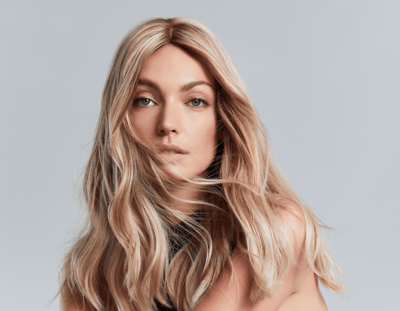 Not everyone is a candidate for Minoxidil treatment, so it's important to have other options in your hair loss arsenal. Wigs are a great way to cover up thinning hair and give the illusion of fuller, healthier tresses.
Not everyone is a candidate for Minoxidil treatment, so it's important to have other options in your hair loss arsenal. Wigs are a great way to cover up thinning hair and give the illusion of fuller, healthier tresses.
When choosing a wig, quality is of the utmost importance. The last thing you want is an itchy, uncomfortable wig that looks fake, so look for one that's made with 100% human hair that's hand-tied to a breathable, lace front cap.
Daniel Alain uses the finest, most precious European hair to create natural-looking, beautiful wigs that look and feel just like the real thing. Our team of expert wig makers will work with you to find the perfect style, color, and fit for your needs.
Shop Follea by Daniel Alain Human Hair Wigs
Hair Transplant Surgery
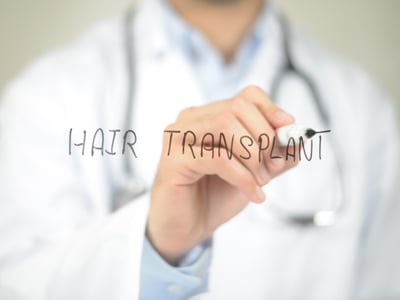 In some cases, the causes of hair fall are permanent and nothing short of surgery will help. If you've exhausted all other options and you're still struggling with thinning or shedding, it might be time to consider hair transplant surgery.
In some cases, the causes of hair fall are permanent and nothing short of surgery will help. If you've exhausted all other options and you're still struggling with thinning or shedding, it might be time to consider hair transplant surgery.
Hair transplant surgery involves taking grafts of skin that contain healthy hair follicles from one area of the scalp and transplanting them to the balding or thinning areas. This is a permanent solution that can give you back the thick, healthy head of hair you once had.
Not everyone is a candidate for hair transplant surgery, so it's important to consult with a hair loss specialist to see if this is the right option for you.
Protein-Rich Plasma (PRP) Injections
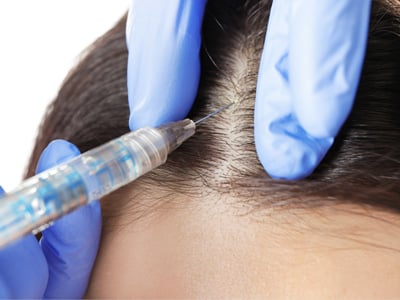 Injections of protein-rich plasma (PRP) are another option for treating hair loss. PRP is a concentration of platelets and growth factors that can promote healing and regeneration in your follicles.
Injections of protein-rich plasma (PRP) are another option for treating hair loss. PRP is a concentration of platelets and growth factors that can promote healing and regeneration in your follicles.
When injected into the scalp, PRP can stimulate hair growth and help to thicken existing hairs. However, this treatment is only used to help those with a specific type of hair loss called androgenic alopecia (commonly referred to as male or female pattern baldness).
If you think you might be a candidate for PRP injections, consult with a hair loss specialist to discuss your options.
Stop Hair Fall in its Tracks with Daniel Alain
If you're struggling with hair fall, know that you're not alone. Millions of women battle hair loss every day, and there are treatments available that can help. You don’t have to feel helpless anymore. You have the power to combat hair loss and find the right solution.
At Daniel Alain, we offer various options for treating all the common causes of hair fall and loss. Whether you're just starting to experience thinning or your hair fall is more severe, we're here for you.
Find answers to all of your hair loss questions in our Learning Center.
need help finding a hair loss solution
Schedule a Free Consultation with One of Our Stylists

Frequently Asked Questions
Why is So Much of My Hair Falling Out?
It's normal to lose 50-100 strands of hair per day, but if you're noticing more shedding than usual, it could be a sign of an underlying issue. There are many possible causes of increased hair fall, including:
- Hormonal changes
- Tight hairstyles
- Over-brushing
- Nutritional deficiencies
- Stress
- Medications
- Autoimmune diseases
- Age
- Genetics
What Causes Hair to Fall Out From the Root?
There are several possible causes of hair fall from the root, including:
- Traction Alopecia: This is caused by wearing tight hairstyles that pull on the hair and damage the follicles.
- Alopecia Areata: This is an autoimmune disorder that attacks the hair follicles, causing them to fall out.
- Telogen Effluvium: This is a condition that causes the hair to enter the resting phase and shed more than usual. It can be caused by stress, illness, or certain medications.
In addition to those conditions, how you care for the health of your hair, physical body, and mental health all play a role in how strong your follicles are.
What Vitamin Deficiency Causes Hair Fall?
The most common vitamin deficiency that causes hair fall is iron deficiency. When you don't have enough iron in your body, it can lead to anemia, which in turn can cause hair loss. Other vitamin deficiencies that can cause hair fall include deficiencies in vitamin D, B vitamins, and zinc, though those are less common.
Does COVID Cause Hair to Fall Out?
The CDC doesn't recognize a direct link between COVID-19 and hair fall, but the stress and anxiety that come with the pandemic can trigger or worsen conditions that cause hair loss. While hair loss is not a known symptom of the virus, a study found that 27% of COVID patients reported significant increases in hair loss during recovery.
Can Stress Cause Your Hair to Fall Out?
Yes—the scientific term for this is telogen effluvium. When you're stressed, your body releases more cortisol that can disrupt your hair's natural growth cycle, resulting in more hairs entering the resting phase and falling out. This type of hair loss is usually temporary and will stop once the stressor is removed.
What Causes Hair to Fall Out in Clumps?
Hair that falls out in clumps is usually a sign of an underlying condition, such as alopecia areata or telogen effluvium. If you notice clumps of hair falling out, consult with a hair loss specialist to determine the cause and find the best treatment for you.
Does Menopause Cause Your Hair to Fall Out?
Your body experiences a lot of hormonal shifts and changes when you go through menopause—many of which could cause hair fall. A decrease in estrogen levels can lead to thinning hair, while an increase in testosterone levels can cause hair to fall out from the root. If you're experiencing menopausal hair loss, talk to your doctor about treatment options.
Does Psoriasis Cause Hair to Fall Out?
Yes, but only temporarily. Psoriasis is a skin condition that can cause the hair follicles to become inflamed, leading to shedding. The good news is that this type of hair loss will stop once the psoriasis flare-up has passed.
Do Split Ends Cause Hair Fall?
No, split ends do not cause hair fall—but they are a sign of damaged hair. When the ends of your hair are dry and brittle, they're more likely to break off, which can make your hair look thinner. To prevent split ends (and hair fall), use a deep conditioning treatment once a week and avoid heat styling as much as possible.
Can Chlorine Cause Hair to Fall Out?
No, exposure to chlorine doesn't cause hair fall. It's a myth that swimming too much can lead to hair loss, though it is true that chlorine can dry out and damage your hair. To prevent this, wet your hair before you get in the pool and rinse it with clean water as soon as you get out.
Can Dehydration Cause Hair to Fall Out?
No, dehydration doesn't cause your hair to fall out, but it can accelerate hair loss if you're already experiencing it. When your body is dehydrated, it's more likely to enter into a state of stress, which can trigger hair shedding. To prevent dehydration (and hair fall), make sure you're drinking plenty of water every day.
Can Lice Cause Hair Fall?
Yes, if lice go undetected and untreated for too long, it can cause hair fall. Lice feed on blood, which can weaken the hair follicles and lead to shedding. If you think you have lice, consult a doctor or lice specialist for treatment options.
Can Too Much Biotin Cause Hair to Fall Out?
No, biotin is a water-soluble vitamin that's necessary for healthy hair growth. While it's possible to take too much biotin (which can lead to skin and digestive problems), it's very unlikely to cause hair fall.
Can Weight Loss Cause Hair to Fall Out?
Yes—when you lose a significant amount of weight (either through restrictive dieting or weight loss surgery) it can cause hair fall. This type of hair loss is usually temporary and will stop once you've stabilized at your new weight. If you're concerned about hair loss, talk to your doctor or a registered dietitian.
Can Shampoo Make Your Hair Fall Out?
Over-washing your hair with a sulfate shampoo can strip your hair of natural oils, which can lead to dryness and breakage. This, in turn, can make your hair more susceptible to shedding. To prevent this, only shampoo your hair 2-3 times per week and use a sulfate-free formula. You can also protect your hair with an anti-shedding treatment, like INTACT.
Does Applying Conditioner Cause Hair Fall?
No, hair conditioner doesn't cause hair fall. In fact, conditioner helps to moisturize and protect your hair, making it less likely to break or fall out.
Does a Dry Scalp Cause Hair Fall?
A dry scalp doesn't directly cause hair fall, but if it's accompanied by constant itching, it can lead to hair breakage. When the hair shafts become weak, they're more likely to snap off, resulting in thinning hair. To prevent a dry scalp (and hair fall), use a gentle shampoo and conditioner, and avoid over-washing your hair. You can also use a scalp mask or oil to keep your scalp hydrated.
Does Hot Water Cause Hair Fall?
Water has to be boiling in order for it to cause hair fall. While hot water won't directly cause your hair to fall out, it can strip your hair of natural oils, leading to dryness and breakage. This, in turn, can make your hair more susceptible to shedding. To prevent this, use lukewarm water when washing your hair and avoid overly hot showers.
Does Keratin Treatment Cause Hair Fall?
It depends on how often you get them. These kinds of treatments use extreme heat to straighten your hair, which can damage the protein bonds within the hair shaft. This can lead to dryness, breakage, and eventually, hair fall. If you do get keratin treatments, make sure to use a deep conditioner once a week to keep your hair healthy and avoid getting them too often.
Does Rogaine® Cause Hair to Fall Out?
Increased hair shedding is normal when you first start using Rogaine®. This is because the active ingredient in Rogaine®, Minoxidil, works by stimulating blood flow to the hair follicles. In the beginning, this can cause the follicles to release any dead or dying hairs that are clinging on. The shedding should stop after a few weeks, and you should start to see new hair growth.
Does Smoking Cause Hair to Fall Out?
Yes—smoking can cause hair fall. This is because smoking decreases blood flow to the scalp, which in turn, reduces the nutrients that reach the hair follicles. This can lead to weak and brittle hair that's more likely to break or fall out. If you're concerned about hair loss, talk to your doctor about ways to quit smoking.
Does Vaping Cause Hair to Fall Out?
Yes, vaping has the same effect on your hair as smoking cigarettes does as it contains nicotine.
Does Dandruff Cause Hair Fall?
Dandruff doesn't directly cause hair loss, but too much itching and scratching can damage your hair follicles and lead to hair breakage. When the hair shafts become weak, they're more likely to snap off, resulting in thinning hair.
Can Thyroid Issues Cause Hair Fall?
Yes, both hypothyroidism and hyperthyroidism can cause hair fall. This is because the thyroid gland regulates hormone levels in the body, and when it's not functioning properly, it can lead to a hormonal imbalance. This can cause a variety of symptoms, including hair loss. If you think you might have a thyroid problem, talk to your doctor.
Does Coloring Your Hair Cause Hair Fall?
Hair dye damages your strands, making them more susceptible to breakage. This can lead to thinner, weaker hair that's more likely to fall out. Because of this, regularly coloring your hair can lead to hair loss over time.
What are the Symptoms of Excessive Hair Fall?
If you're losing more than 125 hairs a day, it's considered excessive hair fall. No, you don't have to count every single lost strand to know if you're shedding too much—just take a look at your pillow in the morning or after brushing your hair to see if there's an unusually large amount of hair. Other symptoms of excessive hair fall include thinning hair, bald spots, and a receding hairline.
When Should I See a Doctor About Hair Fall?
You should see a doctor about hair fall if you suspect a disease or hormonal balance is to blame. A doctor can order blood tests to check for conditions like anemia or thyroid problems. If you're not sure what causes hair to fall out for you, a doctor can also help you rule out other possible causes.
What is the Best Treatment for Hair Fall?
The best treatment for hair fall is the treatment that works for you. Once you've determined the underlying causes of hair fall, you can work to find a treatment that will help. If you're having trouble finding a solution to your hair thinning or shedding, reach out to one of our experts at Daniel Alain. We'll work with you to find the best possible solution for your hair fall problem.


